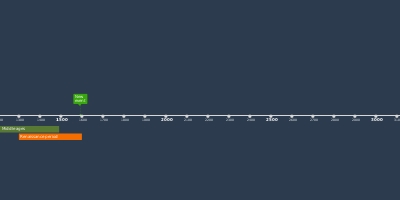Renaissance period (jan 1, 1300 – jan 1, 1600)
Description:
The Renaissance was a period in European history denoting the change from the Middle Ages to Modernity and covering the fifteenth and sixteenth hundreds of years. Notwithstanding the standard periodization, defenders of a long Renaissance put its start in the fourteenth century and its end in the seventeenth century. The conventional view concentrates more on the early present day parts of the Renaissance and contends that it was a break from an earlier time, however numerous students of history today center more around its medieval angles and contend that it was an augmentation of the Middle Ages.The scholarly premise of the Renaissance was its form of humanism, got from the idea of Roman Humanitas and the rediscovery of traditional Greek way of thinking, for example, that of Protagoras, who said that "Man is the proportion of all things." This new reasoning got show in craftsmanship, design, governmental issues, science and writing. Early models were the improvement of point of view in oil painting and the reused information on the most proficient method to make concrete. Despite the fact that the innovation of metal versatile sort sped the scattering of thoughts from the later fifteenth century, the progressions of the Renaissance were not consistently experienced crosswise over Europe: the absolute first follows show up in Italy as ahead of schedule as the late thirteenth century, specifically with the works of Dante and the canvases of Giotto.
As a social development, the Renaissance included imaginative blooming of Latin and vernacular literary works, starting with the fourteenth century resurgence of learning dependent on old style sources, which counterparts credited to Petrarch; the improvement of straight point of view and different strategies of rendering a progressively normal reality in painting; and continuous yet across the board instructive change. In legislative issues, the Renaissance added to the advancement of the traditions and shows of discretion, and in science to an expanded dependence on perception and inductive thinking. In spite of the fact that the Renaissance saw upsets in numerous scholarly interests, just as social and political change, it is maybe best known for its imaginative improvements and the commitments of such polymaths as Leonardo da Vinci and Michelangelo, who propelled the expression "Renaissance man".
The Renaissance started in the fourteenth century in Florence, Italy. Different hypotheses have been proposed to represent its sources and qualities, concentrating on an assortment of components including the social and metro characteristics of Florence at the time: its political structure, the support of its predominant family, the Medici, and the relocation of Greek researchers and their writings to Italy following the Fall of Constantinople to the Ottoman Turks. Other significant focuses were northern Italian city-states, for example, Venice, Genoa, Milan, Bologna, lastly Rome during the Renaissance Papacy.
Added to timeline:
Date:
jan 1, 1300
jan 1, 1600
~ 300 years
